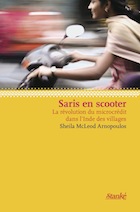Saris on Scooters – How Microcredit is Changing Village India

Renowned author and journalist Sheila McLeod Arnopoulos uses her talent for investigative reporting to take us deep into the poorest villages in India. Yet, far from being passive victims of their circumstances, the women who live there have joined forces and are making astute use of microcredit to break the cycle of poverty.
Microcredit was made famous by Bangladeshi economist Muhammad Yunus and consists of very small loans made primarily to women for the production of essential commodities or to start small businesses. Based on a number of trips to India between 2001 and 2008, Arnopoulos shows her sense of solidarity and desire for authenticity by sharing the daily life of these villagers. This first-person account of her extensive travels focuses primarily on these women's inspiring success stories. After witnessing many such situations first-hand, she believes these villages have a potential strength equal to that of the modern, high-tech cities in India
Saris en scooter – La révolution du microcrédit dans l’Inde des villages

L’auteure et journaliste Sheila McLeod Arnopoulos propose, dans la tradition des grands reportages, une incursion fascinante dans l’univers de villageoises indiennes parmi les plus pauvres. Loin d’être des victimes, ces femmes, très souvent illettrées mais dotées de qualités de leadership exceptionnelles, se regroupent et font appel au microcrédit afin de briser le cycle de la pauvreté.
Popularisé par Muhammad Yunus, un économiste bangladais, prix Nobel de la paix 2006, le microcrédit consiste à accorder de très petits prêts, principalement à des femmes, pour la production de denrées essentielles ou la création d’entreprises. Au gré de multiples séjours en Inde entre 2001 et 2008, Sheila McLeod Arnopoulos, qui ne ménage pas ses efforts pour donner originalité et authenticité à son récit écrit à la première personne, a partagé le quotidien de ces femmes de tous âges à la solidarité exemplaire. Vivant parmi elles, parcourant des kilomètres à pied, en rickshaw, en autobus ou en train, l’auteure a recueilli le témoignage émouvant de leur réussite. Elle montre ainsi que les villages indiens, qui comptent au total quelque 750 millions d’individus, représentent une force potentielle aussi grande que celle des villes modernes de haute technologie dont les médias internationaux ont tant vanté les mérites.
Q&A with Sheila McLeod Arnopoulos
How did you come up with the idea for this work?
I have always written about marginalized people. In Montreal as a journalist I worked undercover in textile factories, for example, and wrote about the exploitation of immigrant women. Later, I became fascinated by the potential of microcredit to empower poor women when an Indian friend introduced me to Dalit (formerly untouchables) women in parched Indian villages who used small loans and organic agriculture to make the deserts bloom. Here was an opportunity to write a success story book! This led me to other Indian villages and slums where I met spirited women who refused to be victims and instead were banding together in microcredit groups to beat poverty and also promote social change.
Tell us a little about the overarching theme of your book.
Although about microcredit, my book is also a glimpse into the Indian side of an unsung Third World Women’s Movement of grassroots women working for a more egalitarian and flourishing world. Women I met were, for example stopping child labour and child marriage, in one case by forming a village youth group that young couples had to consult before their wedding could take place. Under the NGO Gram Abhyudaya Mandali, cooperatives of Dalit women were running a sand contract and getting ready to launch a full-fledged dairy. High-caste male bureaucrats, goons and rival contractors tried to destroy them but the women came up with brilliant solutions to outfox their adversaries, made money, and showed that they were first-rate entrepreneurs that could overcome.
Preserving their community during a political crisis was the work of poor Muslim women in a handicraft cooperative under an organization called Confederation of Voluntary Associations providing microcredit to the poor in Hyderabad. In full burqas, the women formed a chain to stop a potential riot provoked by Hindu police against their husbands and sons after Friday prayers at a mosque in the Muslim quarter of the old city of Hyderabad.
How did you research your book?
I have always written about marginalized people. In Montreal as a journalist I worked undercover in textile factories, for example, and wrote about the exploitation of immigrant women. Later, I became fascinated by the potential of microcredit to empower poor women when an Indian friend introduced me to Dalit (formerly untouchables) women in parched Indian villages who used small loans and organic agriculture to make the deserts bloom. Here was an opportunity to write a success story book! This led me to other Indian villages and slums where I met spirited women who refused to be victims and instead were banding together in microcredit groups to beat poverty and also promote social change.
In your own work, which character are you most attached to and why?
Puriben is an illiterate woman who was starving in the desert with her husband and family because of no work on the land due to drought and natural disasters. Under the Self Employed Women’s Association in Gujarat she became a barefoot manager and village leader organizing production of first-class hand-embroidered merchandise now selling on Indian and world markets. A born activist, she fought and won against male elders in her village who at first tried to stop her and her team of artisans from travelling outside the village to sell their embroidered clothes. Later, when the municipality failed to provide water to her village, she made them deliver after she led 200 women balancing empty clay pots on their heads on a 70-kilometre protest march from her village to the municipal water board. To show-case her embroidery skills, on behalf of her company, Puriben made regular sales trips to Delhi and cities in the West. But she was never seduced by the attractions of the urban consumer society and continued to value community life in her small Indian village of Vauva.
Describe the most memorable response you’ve received from a reader.
The most memorable response about my book came from the leader of one of the major organizations I profiled in my book. When he read the chapters that involved the women in his NGO, he said: You have made literature out of the lives of the women.
Radio Interviews
All in a Weekend with Sonali Karnick
CBC Radio
Award-winning journalist and author Sheila McLeod Arnopoulos talks about her new collection of short stories. It's about Montreal women from a variety of cultural backgrounds, at home and in other countries, including India, Tunisia, Morocco, Portugal and Mexico, and how they manage to succeed and thrive despite the obstacles they face.
Listen to interview →
The Indo-Canadian Report with Rashi Khilnani
Radio Canada International
Author Sheila McLeod Arnopoulos tells us about the 21 months she spent in India meeting women who used microcredit to change their lives and the lives of others.
Listen to interview →
Masala Canada
Radio Canada International
Montreal investigative journalist and author Sheila McLeod Arnopoulos will talk about her new book Saris on Scooters – How Microcredit is Changing Village India. She talks about the time she spent in villages with grassroots organizations, and Dalit women who are using small loans and their determination to win greater financial independence and gain respect for their rights.
Listen to interview →
Dimanche magazine
Radio-Canada premiere chaine
Depuis 2001, l’auteure et journaliste Sheila McLeod Arnopoulos a effectué de longs séjours dans l’Inde des villages. Dans son livre Saris en scooter : la révolution du microcrédit dans l’Inde des villages, elle décrit la vie de villageoises indiennes, très souvent illettrées, mais dotées de qualités de leadership exceptionnelles et qui réussissent, grâce au microcrédit, à briser le cycle de la pauvreté.
Listen to interview →

